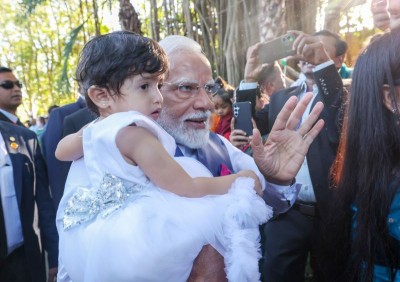
Had warned Centre that GSTN won’t be able to take this much load: Amit Mitra
“I had repeatedly said please postpone the launch of July 1, what is the impact - everyday postponements, they are saying that GSTN (Goods and Service Tax Network) could not take the load, this is what I had predicted but they did not pay heed to that,” he said.
“Exactly this is what I had said in that meeting, 300-340 crores of up-linking will have to be dealt with GSTN, is it ready? They had done beta test of 200 companies per state and 30 per cent of that did not work very well,” added Mitra.
He further said that he had repeatedly warned that SMEs (small and medium enterprises) will get killed because they are the biggest sufferers in this regard.
The Minister for finance, commerce and industries also said that West Bengal fared much better than the nation when it came to parameters like – gross value added (GVA), growth in agriculture, industry and services sectors.
“In 2015-16, the GVA in India grew by 7.3 per cent while in West Bengal it grew by 12.02 per cent, agriculture sector grew nationally by 1.1 per cent but in West Bengal it grew by 5.55 per cent, similarly industrial sector grew nationally by 7.3 per cent while in West Bengal it grew by 10.59 per cent and services sector in India grew by 9.2 per cent while in West Bengal it grew by 13.99 per cent,” said Mitra.
He also shared concerns on number of employment opportunities in India coming down from 12.8 lakhs between 2011-2013 to 6.4 lakh between 2014-2016. “It is a very serious matter because without employment and jobs in the country, what is the industry for at the end of the day.”
Referring to the fall in bank credit growth, index of industrial production, and gross fixed capital formation together with rise in banks’ non-performing assets, Mitra said, “On one hand you see the investment proxy sharply falling, IIP in serious trouble while NPAs are going up to 11.97 per cent, it is a danger mark.”
He also said that number of farmers’ suicides had also gone up in the country i.e. from 11,772 in 2013 to 12,602 in 2015.
Talking about achievements of his government, Mitra said that IIP (manufacturing) grew from 0.9 per cent in 2011-12 to 5.59 per cent in 2016-17. While IIP (general) grew from 2.14 per cent to 7.27 per cent, during this period.
He also said that state’s per-capita gross state domestic product (GSDP) had increased from 65,232 in 2011-12 to 1,29,656. “This translates into consumer demand and business for the industry.”
The West Bengal finance minister also said that state is generating a reasonable amount of human capital which is coming from 155 new ITIs (industrial training institutes) and 81 new polytechnics added by the state.
He further said that building of 12,500 kms of rural roads and 12,400 kms of highways in 6 years has been a game-changer for rural Bengal.
Apex industry body ASSOCHAM has mooted multi-pronged strategy for developing most backward regions of West Bengal thereby urging the state government to take immediate measures to ensure smooth flow of investments in those districts.
“Considering indicators like agriculture, industry, physical and social infrastructure, Cooch Behar figures on top amid most backward districts of West Bengal followed by Darjeeling, Jalpaiguri, Uttar Dinajpur and Bankura, as such the state government must put special focus on developing these areas,” highlighted the ASSOCHAM paper titled, ‘Strategy for developing most backward regions of West Bengal.’
The ASSOCHAM paper was released by West Bengal finance minister Amit Mitra along with chamber’s president Sandeep Jajodia, immediate past-president Sunil Kanoria and national secretary general D.S. Rawat at an interactive session in Kolkata.
“Districts play an important role in implementation of economic policies and contribute significantly to state’s economic development, as such West Bengal government must focus on laggard districts’ development to attract private investors and realise the huge potential to become a frontline state across India,” said Jajodia.
With agriculture and allied activities being major livelihood provider (44 per cent population) in West Bengal and lion’s share of total land area (over 60 per cent) being used in agriculture, the state must lure more investments in irrigation and encourage farmers to cultivate hybrid crops, suggested the paper.
Besides, the state should promote small and medium enterprises (SMEs) by providing support in terms of technological innovations and conducting research and development in product and process of local enterprises.
“This would ensure sustainability of SMEs’ in the long run to operate in local and domestic markets along with possible expansion globally,” noted the ASSOCHAM paper.
The paper highlighted lack of focus on part of DICs (district industrial centers) on technology and suggested that authorities must assist budding entrepreneurs in packaging, branding and marketing finished products thereby providing training facilities for them to upgrade their skills.
Unavailability of real-time data related to markets, product availability supply and other factors is also a grave concern for SMEs as such creating an innovation delivery platform linked with market intelligence is imperative.
Creating new employment opportunities in the industrial sector by luring investors including both domestic and foreign for setting up industries in sectors like infrastructure, metal and engineering, jute and textile, pharmaceuticals, leather and others by providing them incentives like tax breaks and others must be focussed upon.
Support Our Journalism
We cannot do without you.. your contribution supports unbiased journalism
IBNS is not driven by any ism- not wokeism, not racism, not skewed secularism, not hyper right-wing or left liberal ideals, nor by any hardline religious beliefs or hyper nationalism. We want to serve you good old objective news, as they are. We do not judge or preach. We let people decide for themselves. We only try to present factual and well-sourced news.







